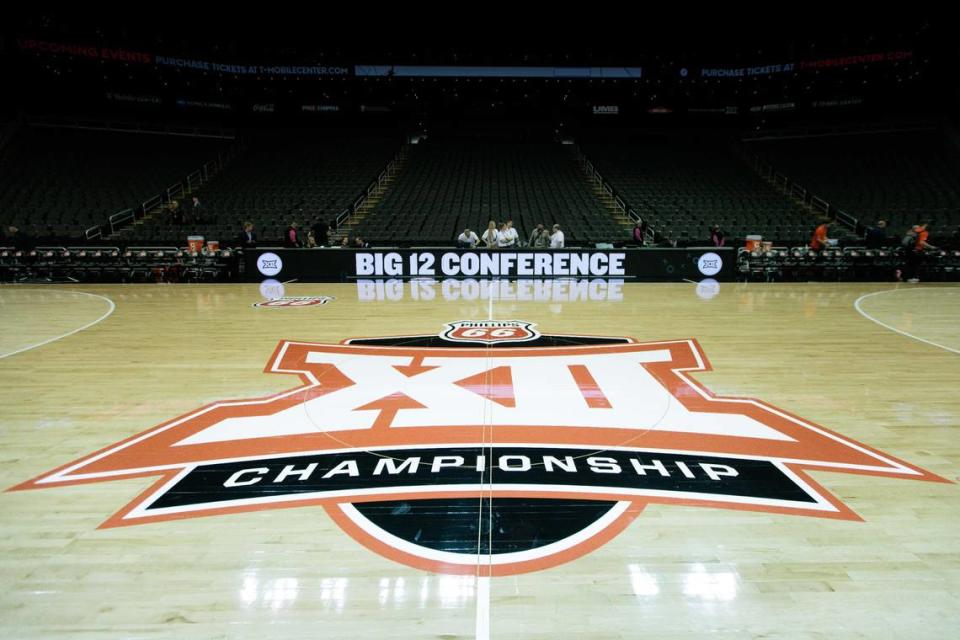College sports is run by football, so why is the Big 12 betting big on basketball?

With the college basketball season over, now we can turn our attention to the games that really matter: Conference realignment, and the exact time of the ACC’s implosion.
As much as this topic exhausts and irritates fans who just want to watch the games, those who put them on nervously propose a variety of just-in-case scenarios around the country. These aren’t “Doomsday” scenarios, but rather a series of potential “What If” chess moves.
We all now live on the SEC and Big 10’s chess board. This includes you, NCAA. Even if you’re not a King or a Queen on this board, you’re OK with being a rook or a pawn, too. Looking at you, Nebraska.
The ACC and Big 12 are in a death struggle to retain their spots No. 3 on the four-conference power poll rankings. Where they sit typically depends on where you live.
To keep its spot the Big 12 is doubling down not on football, but rather basketball. Because all of the premier names in college football belong to the SEC and the Big 10, the Big 12 sees its future as being the best basketball brand in the sport.
As the Big East has demonstrated, this can work. But the Big 12’s vision has a challenge the Big East does not: Football.
Since he was hired as commissioner of the Big 12, Brett Yormark has made it no secret that he believes basketball is an undervalued property. As football continues to eat up more of the basketball season by expanding its playoffs, this is a calculated but necessary risk.
“It’s the best way to keep our spot at the table,” one Big 12 athletic director said.
The table is that of ESPN, Fox Sports, CBS, Turner, or any potential media rights partner that wants to dump money into live sporting events. Think Amazon Prime. Perhaps Apple TV, too.
The Big 12 leaning more into basketball means it will prioritize the schools that make that sport its priority among the remaining ACC teams if/when that league crumbles, if/when Clemson and Florida State leave. According to people familiar with these “hypothetical” conversations, Duke, Virginia Tech, North Carolina State, Pittsburgh, Louisville and Miami are in the “conversation” of the Big 12’s potential wish list.
The early thought on the ACC’s breakup has Virginia and North Carolina headed to the Big 10, at least. Clemson and Florida State march to the SEC. These scenarios are awash in challenges, both monetarily and politically.
With Arizona and Kansas, adding Duke would give the Big 12 three of the top brands in basketball. Throw in league-member Houston and that’s a potential Final Four.
The Big 12 had previously flirted with basketball power Gonzaga University. That potential union never moved beyond the conversation phase, primarily because of football. The Zags don’t have a football team.
Duke’s football program will never be known as USC East, but the Blue Devils have made eight bowl games since 2012.
Historically, it’s a challenge when one, or a few, schools don’t have football but the remaining league members do. It was a challenge in the old Big East before that league executed a re-imagined version of itself where football isn’t a part of the equation.
The only Big East member with an FBS football program is UConn, which plays as an independent.
Even without football, the 11-team Big East has proven that a league can survive, and thrive, in the current landscape of college athletics where “all of the money” is driven from the gridiron. The league is swimming quite nicely.
The wrinkle to this for the Big 12 is football. The Big East is doing well with men’s basketball because nearly all of the available resources from its respective member institution’s athletic departments go to that sport.
The majority of the NIL and its collective money at a Marquette goes to basketball, the same for Creighton, UConn, St. John’s and the rest. At the Big 12 schools, if football isn’t first it’s close. That includes Kansas.
The Big 12’s future is about the league creating a product that has enough value that a future media right’s deal keeps it within a binocular’s view of the SEC and the Big 10.
As much as college basketball has changed over the years, and its lack of familiar faces for fans hurts the marketability of the product, it has value. The Big 12 is betting on the game, and itself.
On a chess board that is now run by the Big 10 and the SEC, this may be the Big 12’s best move to ensure it avoids check mate.

